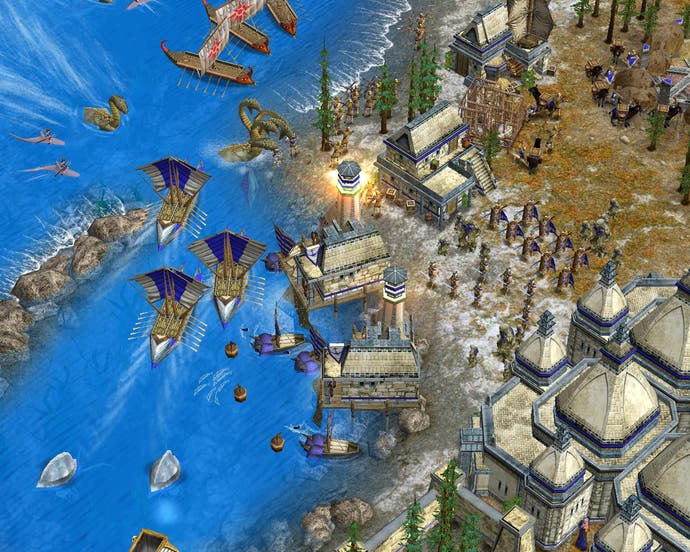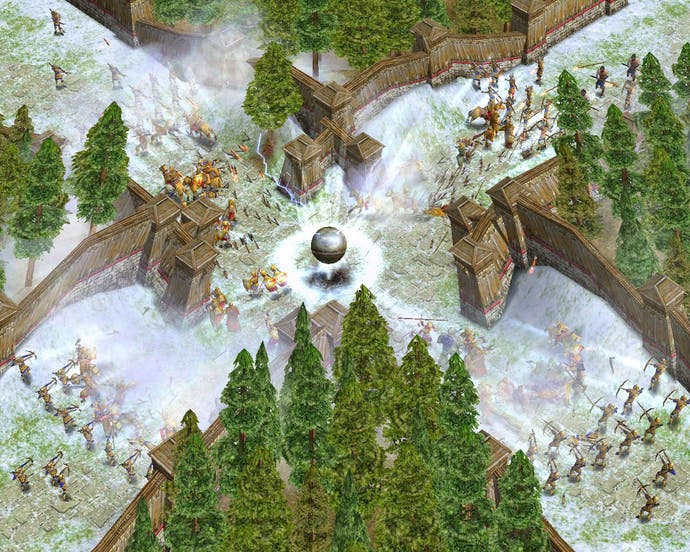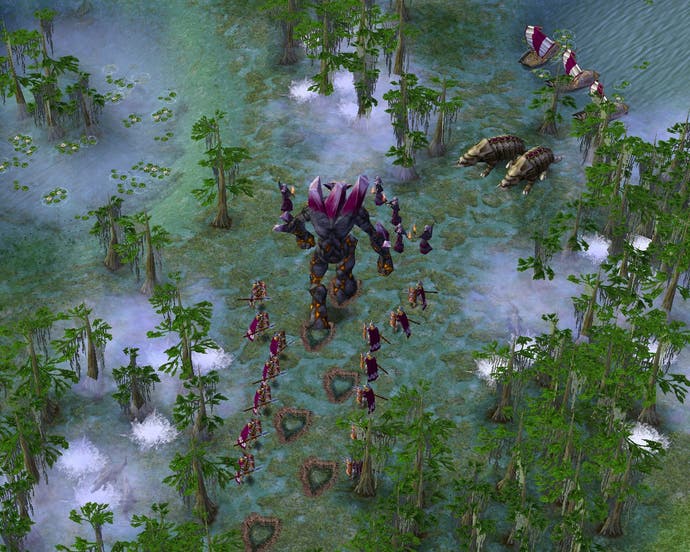Age of Mythology: The Titans
Ensemble tightens up its strategy opus.
It's been a busy year or so for PC strategy fans, hasn't it? All three of the genre's big hitters rolled out their latest incarnations, to varying degrees of success - there was the excellent and genre-breaking WarCraft III, the solid and enjoyable Age of Mythology, and the frankly disappointing Command & Conquer: Generals. As if that wasn't enough, there were plenty of other strategy stunners to be found outside the established series offerings, allowing you to conquer Europe in the dark ages in Medieval: Total War, lead the Roman legions to victory in Praetorians or take command of the Allied campaign to victory in World War II: Frontline Command.
In short, if strategy is more your thing than hectic fragging, it's hardly been a boring couple of years - but just as the new releases dry up a little, the three key strategy franchises return with some mid-term updates in the form of expansion packs to keep you hooked until the developers cook up the next full-size serving of RTS in a couple of years time. WarCraft III has acquired a Frozen Throne (some reference to the lack of central heating in my bathroom, I think), C&C Generals has reached Zero Hour, and Age of Mythology eschews the traditional maxim that size isn't everything by adding The Titans to its mix.
All About Size

As with any expansion pack, the objective of The Titans is simple - Ensemble want to get fans of the original game to fork out more of their lovely lolly in return for added playing time at Age of Mythology. To this end, the pack focuses on adding new content rather than making any particularly major changes to the existing game - although there are a few tweaks here and there which players will probably appreciate, and the game has received a fairly major overhaul to the entire endgame system in multiplayer which should prevent any stalemates late in the day.
The first major addition you'll notice is the new race - the Atlanteans. Although these chaps, whose sinking island is a warning from history about what happens when you hand over your plumbing to a PPP enterprise, appeared in the first game, they weren't properly playable - so Ensemble has fleshed them out into a brand new race, with an interesting new set of strengths and weaknesses and quite a radically different playing style to the other races in the game (the Greeks, the Egyptians and the Norse). Although the Atlanteans' buildings broadly resemble those of the Greeks, they have a completely different set of combat units, and they demand a different approach to playing due to significant differences in their resource management and Favour systems.
Atlantean villagers, you see, are far more useful and versatile units than their counterparts in other races, because they don't need to deposit goods that they harvest or mine anywhere - the resources simply appear in your coffers as soon as the villager has acquired them. This effectively allows you to ignore resource management issues which can plague the other races, and allows you to harvest resources much more flexibly without having to establish drop-off points nearby; it also means each villager gathers much more efficiently, as they're not wasting time walking to and fro from their work to a drop point. On the flipside, Atlantean villagers are much more expensive than other races', and as such not only do they present a far more enticing target for enemy military units, but it makes it trickier for an Atlantean player to ramp up his resource production at the start of a game.
Favour of the Week

The Atlanteans also have a rather unconventional way of currying favour with the gods; rather than building monuments or worshipping at a temple, they build up Favour (the gradually self-replenishing resource that allows you to build powerful Myth units) by building new settlements. This effectively means that the Atlanteans must expand rapidly at the outset of the game, since more territory means the ability to build more Myth units, and can make multiplayer games with several Atlantean players into an all-out scramble for territory. This is an interesting addition to the game, as it makes the Atlantean play imperative early in the game quite different to the goals of the other races, who'll probably be trying to build up and defend one or two large settlements rather than colonising big chunks of the map.
As you'd expect from a developer of Ensemble's pedigree, the Atlanteans are an extremely well polished and rounded race that fits in perfectly with the other three races in the game - offering a wide selection of new military units, imaginative Myth units and interesting God powers, many of which are multiple-use powers. We particularly liked the one which laid spider webs all over an area of a map, effectively booby trapping it with large pit-spiders which popped out to drag in any unwary enemy units that strayed into their path. Great big bloody huge spiders that lunge out and devour unsuspecting men are always a favourite in videogames around here, after all - which is interesting, given that certain people in the Eurogamer office won't even deal with little bite-sized ones in the sink.
One other aspect of the forces of Atlantis that's worth a special mention is the fact that their barracks are divided into two distinct types - those that produce offensive units, and those that produce counter-offensive units. This is a neat trick which encourages the player to think about the use of combined arms forces a bit more than most RTS games do - a decisive victory can be achieved by scouting out your enemy to find out what type of units he's building, and then building the appropriate counter-units to back up your own offensive forces.
They Might Be Giants

The Atlanteans also have one other trick up their sleeve that will be new to players of Age of Mythology - namely the Titans, a race of bloody huge giants that can be summoned by building a Titan Gate in the new final Age in the game, the Age of Titans. This is an ability which is also open to the other three races in the game, and each race has a unique Titan which can be summoned to wreak havoc on the map. The design flair behind the Titans is remarkable - each one arrives in a dramatic animation as your Titan Gate is completed and the summoning finishes, and each gigantic creature is uniquely designed to fit in with the race it represents.
Titans are effectively super-weapons - they're practically impervious to normal attacks, and can lumber their way around the map destroying buildings with a few well placed punches and munching through entire armies of normal forces with disdain. They're not immortal - just incredibly hard to kill, and although huge forces of normal units will do some damage, it's tough to inflict more than a scratch on a Titan without using hero units. The best way to destroy a Titan is with - you guessed it - another Titan, and it's certainly fun to watch two of these giants duke it out in the middle of a village.
Many strategy games use hugely powerful super-weapons as catalysts for making sure that multiplayer games don't end in stalemates as both players build up strong economies and neither is capable of mustering enough force to take out the other for good, and the Titans certainly serve that purpose admirably - and, we must say, they're far more interesting that the standard nuclear weapons that most strategy games hand you when they think the action is dragging on a bit. More "hardcore" players might not appreciate the addition of the Titans, but for the vast majority of players, they give the endgame of Age of Mythology much-needed structure, and they turn the whole game into an entertaining race through the ages until players can start building their Titan Gates - complete with the sabotage efforts you'd expect during the building process, which is a task that takes just as long as building a Wonder.
A Finger of Fudge is Just Enough...
Of course, Titans also builds upon the strong single-player game in Age of Mythology, picking up where the story of the original game ended. The Atlanteans have spurned the gods of Olympus and started worshipping Chronos and his ilk, and hatched a cunning plot to free the Titans from their prison in Tartarus - it's up to the rest of the world (the other three races) to put a stop to this. As before, the story is told with great in-engine cut-scenes, although we did find the quality of voice acting a little suspect this time around - less spent on the recording for a mission pack, perhaps? But there's plenty of meat to the single-player game, and it provides a good introduction to the Atlantean race to boot.
Ultimately, The Titans provides just about enough to be worthy of the price of entry if you're an Age of Mythology fan. The new single-player campaign is slickly presented and a lot of fun, while the addition of the new race and the Titans themselves should give a fair bit of extra longevity to the multiplayer aspect of the game. Changes elsewhere are minimal - the only major one we noticed was the ability to tell buildings to continue producing a certain type of unit indefinitely, which is useful but can also be economically crippling if you forget that you've clicked it - not one for the absent minded. All in all, we're fairly happy to recommend The Titans to fans of the original Age of Mythology - at the price of entry of an expansion pack, it'll provide plenty more solid entertainment and should fill a gap until the next excellent PC strategy title arrives in stores.

